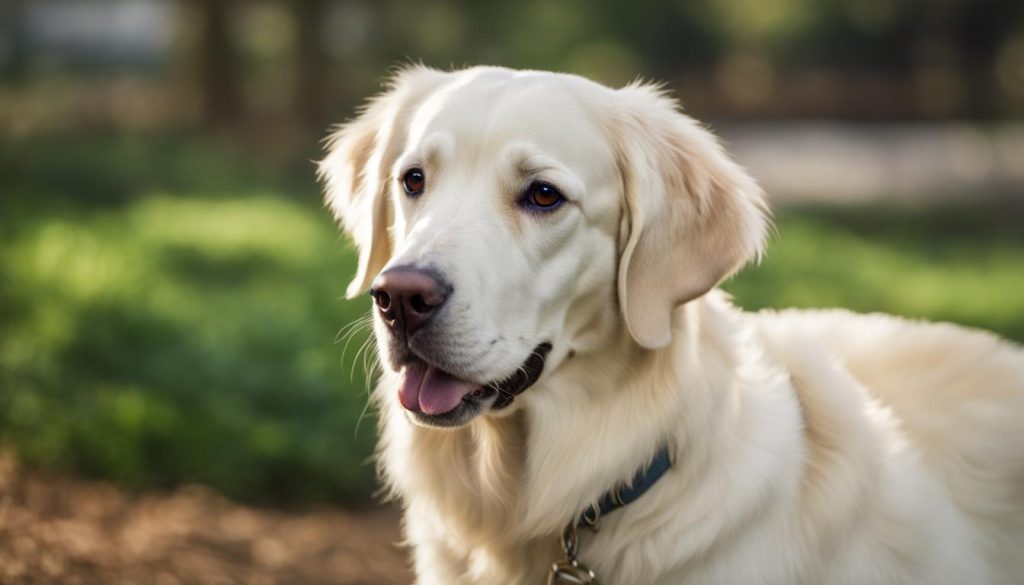Caring for a pet involves multiple layers, from ensuring their physical well-being to fostering their mental development. For white retriever owners, recognising their pet’s specific needs is crucial. As of 2023, refined methodologies in white retriever care tips, white retriever grooming, and white retriever training aim to cover both basic and complex care requirements. Adopting these informed strategies is key to avoiding prevalent white retriever health issues and guaranteeing a happy, vigorous lifestyle for these beloved dogs.
Key Takeaways
- In-depth understanding of white retrievers enhances care and training efficacy.
- 2023 brings the latest insights into grooming practices tailored for white retrievers.
- Training should be adapted to the white retriever’s intelligent and social disposition.
- Awareness of breed-specific health issues underpins preventative care.
- Nutrition and exercise remain cornerstones of white retriever care.
Understanding White Retriever Characteristics
Cherished for their radiant coats and amiable personalities, white retrievers are notably distinct within retriever dog breeds. Their remarkable appearance and friendly demeanor elevate them above others. This exploration into their unique traits illustrates why they are considered prized companions for families and individuals.
Distinctive Traits of White Retrievers
White retrievers feature a uniquely pale, almost luminescent coat that captivates onlookers. Beyond their stunning fur, they boast a robust physique and charming expressions. These dogs maintain a healthy weight, exemplifying a perfect harmony of strength with grace.
Temperament and Behavioural Aspects
The disposition of white retrievers combines kind affability with zealous vivacity. Recognized for their acumen, they are exceedingly trainable and versatile. Their gregarious nature ensures they thrive among human companions, displaying an affinity for children. They possess copious energy, thus necessitating regular activity and playful engagement.
White Retriever Information: History and Origins
The ancestry of the white retriever is deeply embedded in a history of meticulous breeding. Originating from a common lineage with other retrievers, they were selectively bred to accentuate traits, notably their ivory coat. This breed’s development is attributed to the dedication of prominent, possibly the best white retriever breeders, anchoring the white retriever’s place in the dog community.

Understanding the characteristics of the white retriever is crucial for aspiring owners, laying the groundwork for a profound, lasting bond. They demand not just admiration for their beauty but a thorough understanding and commitment to their well-being. This ensures their integration as valued family members.
Essential White Retriever Care Tips
Taking care of a white retriever demands a comprehensive strategy focusing on routine grooming, meticulous health maintenance, and the promotion of overall wellbeing. This guide will highlight white retriever care tips crucial for the breed’s prolonged health and contentment.

White Retriever Grooming transcends aesthetic appeal, playing a critical role in the dog’s health. Their plush white coats necessitate regular brushing to prevent matting and to ensure cleanliness. The light hue of their fur highlights dirt, thus requiring frequent baths yet avoiding excessive bathing which might deplete their skin’s natural oils.
- Bathing – Monthly, or when necessary to maintain a bright and clean coat
- Brushing – Multiple times a week to eliminate loose fur and avoid tangles
- Nail Clipping – Monthly, to preserve paw health and prevent overgrown nails
- Ear Cleaning – Consistent checks to avert infections, especially given their affinity for the outdoors.
Regarding white retriever health concerns, it is imperative for owners to watch for symptoms of prevalent conditions such as hip dysplasia, ear infections, and ocular issues. Periodic veterinary examinations that include assessments of the hips and eyes are vital for prompt identification and treatment. Moreover, sustaining an optimal weight is pivotal to lessen the likelihood of joint disorders.
| Health Concern | Preventative Measures | Signs to Watch For |
|---|---|---|
| Hip Dysplasia | Employ weight management and ensure proper nutrition. | Symptoms include limping or a reluctance towards exercise. |
| Ear Infections | Maintain dryness and cleanliness of the ears. | Indications are scratching at ears or head shaking. |
| Ophthalmic Issues | Include regular eye examinations in vet visits. | Look out for cloudiness or discharge from the eyes. |
At the heart of white retriever care tips lies the need for a nourishing diet that supports their energetic lifestyle. It’s essential to feed them high-quality dog food, rich in protein, with the correct proportions of fats and carbohydrates. Managing portion sizes is equally crucial to avoid overfeeding and obesity, to which they are notably susceptible.
“A strong bond with your white retriever begins with meticulous care — from grooming to dietary needs; keeping a watchful eye on health issues goes a long way in nurturing a healthy and joyous pet.”
Enlisting your white retriever in frequent physical activities not only bolsters their physical health but also provides mental engagement. Pursuits such as swimming, fetching, and agility exercises are compatible with their retrieval instincts and can also mitigate behavioural problems resulting from excess energy.
In conclusion, adept and considerate white retriever care tips empower owners to foster an environment that prioritises preventive health strategies, bespoke nutrition and grooming routines, alongside recognition of the breed’s activity inclinations. This approach guarantees that these magnificent canines remain as physically vigorous as they are mentally spirited.
Comprehensive White Retriever Training
Initiating training for white retrievers necessitates patience, an understanding of their traits, and the application of methods tailored for retriever breeds. These dogs exhibit exceptional obedience and a desire to please, making them responsive to positive, consistent training approaches. It’s pivotal for trainers to devise a structured training regimen that leverages the dogs’ inherent learning capabilities.
Beginner’s Obedience: Basic obedience commands—sit, stay, come, heel, and down—lay the foundation for safety and behavioural control. This is essential in every facet of life with a white retriever. Furthermore, early socialization with humans and other dogs is vital. It moulds a retriever’s sociable and flexible nature.
Advanced Training Techniques: Progressing to complex commands and tricks is crucial for keeping a white retriever mentally stimulated. Techniques such as fetching, navigating agility courses, and scent-based tasks exploit the white retriever’s instinctual retrieval abilities.
Integrating rewards and praise into training sessions is essential. This approach encourages the white retriever and cements the learning process.
“Consistency is key, and positive reinforcement builds a trust-based relationship that makes white retriever training not only successful but also a truly enjoyable experience,” underscores the importance of reward-based training for these dogs.
- Establish a routine: Designate specific times for training, walks, and play.
- Use rewards: Treats, toys, and verbal praise motivate and reinforce positive behaviour.
- End on a positive note: Keep sessions short and successful to maintain your dog’s enthusiasm.
| Training Component | Objectives | Techniques |
|---|---|---|
| Basic Obedience | Instil fundamental commands for control | Repetitive practice, consistent cues, rewards |
| Behavioural Training | Correct unwanted habits through positive reinforcement | Reward-based corrections, avoidance of punishment |
| Mental Stimulation | Engage the white retriever’s intelligence and prevent boredom | Interactive toys, puzzles, problem-solving games |
| Advanced Skills | Develop complex tasks utilising retriever characteristics | Agility training, scent work, specialised fetching |
Customising training to exploit the unique qualities of retriever breeds results in a balanced and joyful companion. By consistently applying these techniques, trainers can rear a disciplined yet vivacious pet. Such pets are keen to please and prepared for various life adventures with their owners.
Conclusion
This guide has explored crucial aspects of white retriever characteristics, care tips, and effective training strategies. Admired for their gentle nature and distinctive looks, white retrievers require meticulous grooming and vigilant health surveillance. Possessing a white retriever demands a commitment to embody values of responsibility and commitment.
Prospective owners should seek reputable white retriever breeders, ensuring a heritage of health and temperament that aligns with the breed’s standards. These breeders play a crucial role in providing a pet that is both physically and mentally ready for family life. Expert and enthusiast-led white retriever information acts as a guide for new owners, directing them towards practices that respect the breed’s requirements and enhance owner-pet relationships.
The connection between a knowledgeable owner and a well-bred white retriever fosters a mutually beneficial partnership. This guide aims to equip owners with the understanding to care for their white retrievers with confidence and expertise. The delight in having a white retriever comes with the responsibility to invest in their well-being and education, a task that, if diligently pursued, offers substantial returns.
FAQ
What are the key characteristics of a white retriever?
The distinctive light-coloured coat of white retrievers marks their uniqueness alongside unwavering loyalty and amiable disposition. They boast a robust, muscular physique, paired with a gentle, loving nature and an eminent intellect. This combination renders them exceedingly proficient in obedience and skills acquisition.
How should I groom my white retriever to maintain its coat?
Essential grooming involves biweekly brushing and regular baths to preserve the coat’s whiteness and cleanliness. Focused care on the undercoat during shedding periods is pivotal. This prevents matting and manages shedding effectively.
What kind of training is suitable for white retrievers?
White retrievers excel with early obedience training, centered around socialisation and fundamental commands, employing positive reinforcement. Engaging them in mentally and physically stimulating pursuits, like agility or retrieval games, nurtures their capabilities.
Are there any common health issues I should be aware of in white retrievers?
Susceptibility to hip dysplasia, inherited ocular conditions, and dermatological issues are prevalent among white retrievers. Owner vigilance in securing routine vet check-ups and prompt intervention at health problem indicators is vital.
What diet is recommended for white retrievers?
A nutritional regime, abundant in premium proteins, grains, fruits, and vegetables, is crucial for white retrievers. The diet must align with the dog’s age, mass, and activity levels. Monitoring to avert obesity is indispensable.
How much exercise does a white retriever need?
Requiring a minimum of an hour’s exercise daily, white retrievers are inherently vivacious. Activities may span walks, runs, swimming, or engaging play, addressing their extensive physical and intellectual necessities.
How can I find a reputable white retriever breeder?
Identify breeders demonstrating transparency in breeding practices, and who offer health clearances for progeny and parents, in a clean, stimulating environment. Preferably, those affiliated with breed clubs or associations, conveying extensive breed knowledge and care directives.
What should I consider before getting a white retriever?
Prospective owners must evaluate lifestyle compatibility, dedication to training, exercise, and grooming upkeep. Awareness and preparation for financial obligations, encompassing sustenance, medical care, and potential training courses, are imperative.
Can white retrievers adapt well to living in an apartment?
Albeit possible, apartment dwelling for white retrievers demands commitment to ample exercise and mental engagement to obviate restlessness and behavioural quirks. Owners are tasked with ensuring sufficient physical and mental exercise in constrained spaces.
What age should white retriever training begin?
Commencing at puppyhood, white retriever training should be immediate, integrating early socialisation and diverse environmental exposures. This foundational stage is crucial for cultivating a compliant and sociable adult dog.

